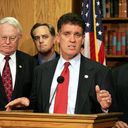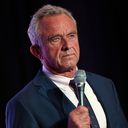Pharma is facing its nightmare scenario
President Trump's bombshell executive order aimed at lowering U.S. drug prices is a step toward a worst-case scenario for the pharmaceutical industry. Some critics say the industry could have done more to avoid it, even though Trump's policies are causing turmoil in almost every sector of the economy.
Why it matters: Trump's announcement could be the start of enormous global disruption for the pharmaceutical industry — or it's the least-bad version of what was on the table, depending on who you ask.
- But the continued risk of a "most favored nation" policy that pegs U.S. drug prices to those paid in other developed nations is a massive threat to drugmakers' bottom lines, especially coming on top of the pharmaceutical tariffs Trump has said he wants to impose.
- The big questions are whether it ever comes to fruition, and whether drugmakers could have done more to avoid getting to this place at all, especially given Trump's laser focus on drug prices and the populist leanings within the GOP.
What they're saying: "The biopharmaceutical industry is working with President Trump and Capitol Hill on solutions to help patients access and afford the treatments they need," Alex Schriver, senior vice president of public affairs at the trade group PhRMA, said in a statement.
- "We remain committed to finding areas of alignment with policymakers to support making America healthy."
The big picture: Yesterday's announcement was sparse on details about how the administration plans to harmonize what the U.S. and other countries pay for drugs, meaning there's no way to know exactly how much trouble the pharmaceutical industry is in.
- The announcement also took a deep swipe at drug "middlemen," who the pharmaceutical industry faults for drug affordability issues.
- But the predicament drugmakers find themselves in marks a fall from grace for an industry that was recently considered among the most powerful in Washington.
- Trump's latest effort comes amid turmoil at the Food and Drug Administration, the administration's slashing of biomedical research funding and the appointment of the nation's most prominent vaccine critic, Robert F. Kennedy Jr., as the nation's top health official.
And all of that follows the passage of the Inflation Reduction Act, which gave Medicare the power to negotiate the prices of certain drugs — a policy the industry had been fighting for decades.
- "This is a 10-year screwup; they've been targeting the PBMs and they've done nothing but lose ground," said one source close to both the drug industry and the White House. "I think they have totally misplayed their hand."
Yes, but: Pharma is far from alone in being on the losing side of Trump's economic policies, and is joined by industries that have bent over backward to curry favor with the administration.
- Trump, however, has bemoaned U.S. drug prices since his first term and has long adopted the kind of anti-pharma language once exclusive to Democrats.
- "This egregious imbalance is orchestrated through a purposeful scheme in which drug manufacturers deeply discount their products to access foreign markets, and subsidize that decrease through enormously high prices in the United States," Trump's executive order states.
Between the lines: The drug industry's critics include health officials from Trump's first administration. Some said PhRMA's primary mistake was not making more concessions after he was sworn in for a second term.
- "When this administration notices that it intends to do something, the only way you get to the table is to be proactive. Look at the agriculture lobby coming into alignment with MAHA — proactivity is your biggest friend in this administration," said David Mansdoerfer, a senior health official in the first Trump administration.
- "Pharma was caught flat-footed and wasn't able to muster a substantive defense," he added. "Of course, trying to explain to an 'America first' president why Americans were paying substantively more for the same drug was always going to be an uphill battle."
The other side: Some analysts argue there may not have been much more that the industry could have done.
- The industry was already trying to fight for relief from the Democrats' drug pricing law, and Trump's focus on global price disparities is a long-standing one.
- Pharmaceutical interests have so far avoided industry specific tariffs, kept most-favored-nation pricing policies out of the GOP's massive reconciliation bill on the Hill, and kept a spotlight on pharmacy benefit managers as the reason drug prices are high.
- "Trump has not hidden how he feels on the issue and he won," said one drug industry lobbyist. "So I wouldn't criticize pharma too much on their lobbying — what are they supposed to do?"
There's also a narrow window of opportunity for the industry: If the U.S. can successfully convince other wealthy countries to pay more for drugs, even if Americans pay less, that could be a win — or at least a wash — for manufacturers.
- "The Administration is right to use trade negotiations to force foreign governments to pay their fair share for medicines. U.S. patients should not foot the bill for global innovation," PhRMA President and CEO Stephen Ubl said yesterday in a statement.
"There are words on a page, but not much substantive there," Raymond James analyst Chris Meekins, a health official in Trump's first administration, wrote in an investor note after the release of the executive order. "It reminds us of how in President Trump's first term he was 'all bark, no bite' on drug pricing."
- But Meekins published a separate note in anticipation of the announcement with a scathing critique of the industry's approach to Trump 2.0.
- "The pharmaceutical industry thought if they just ate with Trump enough and hung out at the White House enough, President Trump would not act on his long held views," he wrote.











